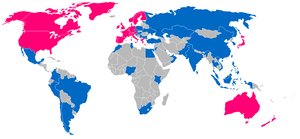 Image via Wikipedia
Image via Wikipedia
The point I want to communicate is that purely North American based companies - start-up or otherwise - will command conservative valuation multiples. Valuation multiples are largely based on market share, operating margins and sustainable free cash flow. Today, we have a sizable IPO/M&A market in emerging markets to use for comparison purposes. Selling to conservative consumers in these economies also forces a firm to operate in a lean and efficient environment - key ingredients that command higher valuation multiples.
As competition in developed economies becomes more costly, small businesses, by their very nature, face operating costs that may become unsustainable. Developing economies enable an organization to learn how to become lean and efficient in the delivery of services to extremely competitive customers. Technology, by definition, helps deliver such services and therefore technology companies have a greater obligation to reach out globally. That key learning aspect is critical for the growth of a small business, especially venture-financed technology companies, in the US. While health care reforms and labor reforms will aid a little bit in managing small business budgets, the key is to understand that flat to negative growth is here to stay in saturated and demographically disadvantaged economies such as the US and western Europe.
![Reblog this post [with Zemanta]](http://img.zemanta.com/reblog_e.png?x-id=eb614540-ce9c-4464-9baa-13834188e69d)





No comments:
Post a Comment